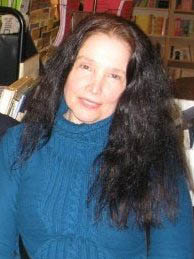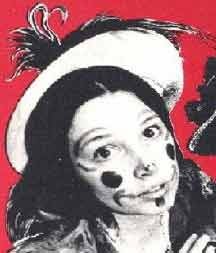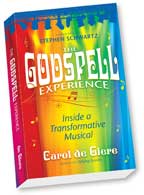Peggy Gordon and Godspell's "By My Side"


 Essential Reading for Godspell Fans
Essential Reading for Godspell Fans
Read about the history of Godspell based on interviews with Stephen Schwartz and the original cast members Peggy Gordon and others. It includes historic photos and more. The Godspell Experience by Stephen Schwartz biographer Carol de Giere
Comment about The Godspell Experience from Peggy Gordon: “I feel privileged to contribute to a book that is the most factually accurate, definitive account of the making of ‘Godspell.’ Fans of the musical will find a treasure trove of information that is nothing short of inspirational.” – Peggy Gordon, composer of “By My Side” and original Godspell cast member
About Peggy Gordon
Peggy Gordon's music for "By My Side" is included in every production and recording of Godspell. She was one of the original cast members for the 1971 Cherry Lane production as the "Peggy" clown, and continued to perform in the show for many years.
She attended Carnegie Mellon University in the 1960s with many of Godspell's other cast members as well as composer Stephen Schwartz. She currently lives in New York City and is a writer, composer, lyricist, singer, and dancer. Hear "By My Side" on Godspell CDs or the movie: Godspell
She wrote the following article for an issue of The Schwartz Scene newsletter.
Godspell's Musical Transition
by Peggy Gordon
The original music, written by a good friend of John-Michael Tebelak for the Carnegie production of GODSPELL, was largely improvisatory. The songs (with lyrics from traditional hymns) were: "Prepare Ye The Way of The Lord," "Save the People," "Day by Day," "Bless the Lord," "All Good Gifts," "Turn Back 'O Man" (which was a ballad), "On The Willows" and what was then called, seriously, "Oh God, I'm Busted!"
When the show moved to La Mama, without John-Michael's friend, Duane Bolick, as composer, the improvisatory underscoring was dropped and two new songs were added. One was "By My Side." I had played "By My Side" for Gilmer, and it was her idea to bring it in for John-Michael to hear and consider for Godspell. The other was Jeffrey Mylett's song, "The Raven and The Swan."
In truth, the show was an absolutely raw, wildflower without strong structure but plenty of genuine heart and soul -- an exuberant diamond in the rough.
After La Mama, when Stephen Schwartz was brought in, he provided additional music: "Learn Your Lessons Well," "All For The Best," "Light of the World," "Alas For You," "We Beseech Thee," "Long Live God;" and then, eventually for the film, Beautiful City."
As I recently told Stephen, we were stunned when we first heard his music at Edgar Lansbury's home. It was not only different, but there was so much more of it! Also, unlike the original music, he had provided a lead singer for each song. with a few exceptions, previously, the music had largely been all group numbers. So, we were protective of the old and a little reserved toward the new. But when we began to rehearse at The Cherry Lane Theater (and, yes, there was a piano brought downstage), we sat around on stage and began to sing. It was heaven--pure, blissful, joyful, exuberant heaven--to learn these songs, to learn our individual harmony parts and then sing them in the context of the show.
"By My Side" was the only song from the La Mama production that was kept in the new show. As Stephen generously said to me, he had tried to write something to fill that spot but couldn't write anything better. This was not only a magnanimous act on his part as a composer; but, as I mentioned earlier, we were somewhat reserved toward him at Edgar's home. It was there that he approached me and gave me this great compliment. I was stunned, and, ironically, it was only when we (Stephen, Sonia Manzano, Robin Lamont and I) had our wonderful dinner before we enjoyed the GODSPELL production at the York Theater (fall 2000) that I remembered to tell him everything I've just told you. We all became such loving, close friends, that, well, I'd simply forgotten to tell him.
The show was and continues to be one of our, collectively speaking, best memories. We will be reliving so many of these wonderful times in May when all the members of all the original companies convene in Los Angeles for our-yikes--30th anniversary reunion.
The meaning of "By My Side"
Ironically, "By My Side" was written for a project we were working on in my freshman year at Carnegie Mellon University. It was originally a love song sung by a character named Marigold to her love, Elkin, so, it was called Marigold's song.
The song's lyricist, Jay Hamburger, was actually the author of the play Marigold and Elkin. (He is also a fine poet and writer/director for a theater, currently in Vancouver Canada.) In the song, Marigold must dare herself to not just declare her love for Elkin, but follow him on his journey. So when John Michael decided to put it into that spot in GODSPELL, it somehow seemed to fit the same need.
In other words, after my character survives the attempts to stone her, Jesus says lovingly that he doesn't condemn her. "You may go. Do not sin again." She, in that moment, knows that she wants to go with him, wherever he goes -- but does she have to courage to ask. So, the lyrics simply mean:
"Where are you going? Where are you going? Can you take me with you?
For my hand is cold, and needs warmth. Where are you going?"
Now, he doesn't verbally respond, but because his back is to the audience facing her, what we played was that he spoke to my heart and told me that he was going...
"Far beyond where the horizon lies, where the horizon lies, where the land sinks into mellow blueness" (a pretty heavy spiritual metaphor)
She realizes and then asks him again... "Oh, please, take me with you." She realizes that she must test herself to make the journey with him, so she says, "Let me skip the road with you. I can dare myself. I can dare myself."
She feels she must prove it so she says, "I'll put a pebble in my shoe and watch me walk. I can walk and walk." And, let me tell you, walking with a pebble is a test of will. While she walks she gains strength and realizes...
"Dare shall be carried" (and "dare" is really a metaphor for her own growing commitment to him)
"and when we both have had enough" (in other words, when she's ready),
"I will take him from my shoe, singing meet your new road" (for there will surely be another who needs to test him or herself to make the journey).
Then she knows she can say, "Then, I'll take your hand, finally glad that I am here by your side."
Now, she knows she'll never "sin no more," but she also knows she'll never leave him. It's metaphorical, but it worked and I built my shy, timid clown from the lyrics of the song.
My clown was the most fearful of the audience, of "stepping forward." That's why the metaphor of daring oneself on a spiritual quest is so meaningful. It was odd that the song fit as well as it did since it was written for another project.
It was Steve Nathan's idea that when they reach out their hands to each other, they should never actually touch because his time on earth was coming to an end. Most of the metaphorical business came from Steve Nathan and John-Michael, one of the reasons there was so much subtext in the show.
Some productions over the years have understood it inherently and some others haven't. It's always wonderful to see a production that's faithful to our original intent. To have the show be about each clown's unique moment of revelation and commitment and through their individual realization build a true community. Perhaps that's why it's endured theatrically.
